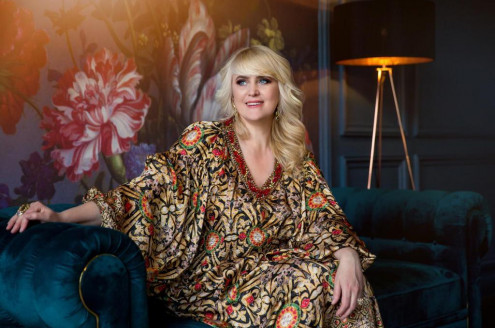Ritual branch of Germany on the example of the land of North Rhine-Westphalia in the hot embrace of legislation
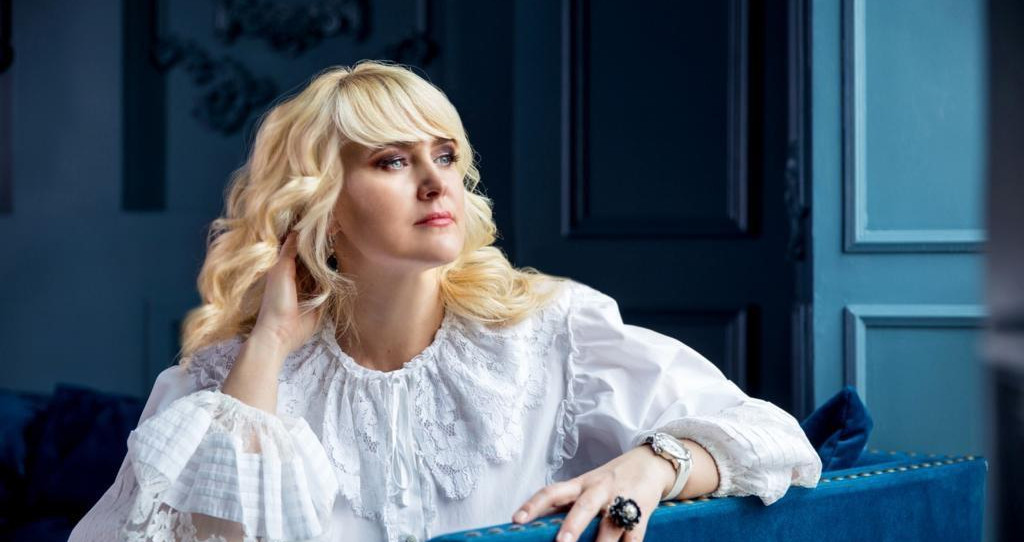
The traditions of funeral culture of European countries have been formed over many centuries. The same can be said, for example, about France, Spain, Italy. According to the President of the International Association of Funeral Professionals, National Member of Ukraine in the World Federation of Funeral Performers (FIAT-IFTA) and the head of the capital's Private Company "Peter the Great" Alla Landar, the ritual branch of Germany on the example of North Rhine-Westphalia reasonable sufficiency and strict pragmatism in the hot embrace of legislation.
The landmark meeting of the FIAT-IFTA Federation in 2014 took place in Düsseldorf, was very interesting and diverse in terms of topics, and opened wide opportunities for us to study the industry with its unique German characteristics. The city is in western Germany, in the Rhine-Ruhr region, which is the capital of the federal state of North Rhine-Westphalia and the residence of the state government of the district of Düsseldorf, and its World Exhibition Center has become the site of our next annual meeting. In addition to the convention, all delegates were looking forward to the opening of the annual World Funeral Culture Exhibition under the auspices of BEFA-Expo.
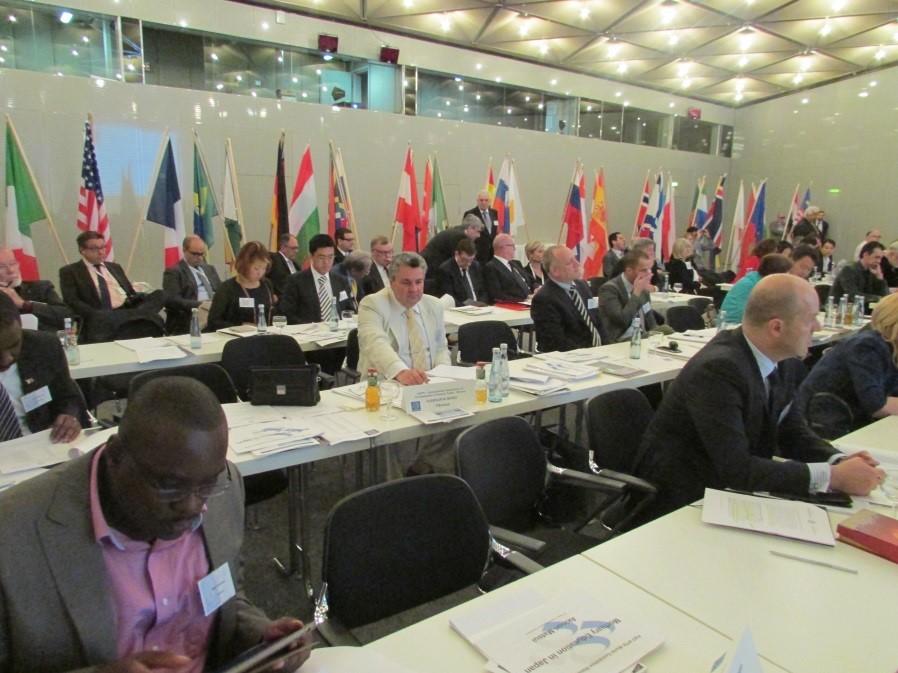
Delegates to the Congress of the World Federation of Funeral Artists (FIAT-IFTA) in Düsseldorf and the flags of their countries
The next meeting was opened by the speaker from Germany, Mr. Likhter. He reported that 80 percent of German funeral directors are members of the BDB, the German Funeral Home. The national annual death toll is approximately 865,000 per year. Of these, 45% are traditional burials and 55% are cremation. Cremation is much more prevalent in the northern part of the country and in large cities.
Subsequently, the audience heard a report by the President of the Federation, Mr. Klaus-Dieter Wolf, who spoke about two major successes for FIAT-IFTA - the new status of "Non-Governmental Consultative Organization" at the UN (ECOSOC) and "Non-Governmental Consultative Status" at the UNESCO Intangible Cultural Heritage Committee. For both organizations, FIAT-IFTA now prepares materials and presentations related to the interests of the funeral industry in the world.
The conference of the Funeral Heritage Committee, held in Chantilly, near Paris, was widely and substantively discussed, as well as the complex issues of funeral repatriation, which has become more widespread over the years on all continents in terms of returning the ashes of the dead or fallen in military battles. epoch to native lands.
Funeral heritage, along with repatriation services, is one of the important components of the Federation's work. There are very different forms of burial and cremation all over the world, which always depend on the culture and social development of the nation. Some of the funeral rites are so ancient that they are already becoming little known to the younger generation. That is why FIAT-IFTA sees it as its responsibility to preserve this baggage of knowledge for future generations in cooperation with UNESCO.
In recent years, FIAT-IFTA has developed into a true protector of the funeral heritage, and this success, combined with the high recognition of FIAT-IFTA's activities around the world, has become another important reason why many new members have joined the Federation in recent years.
The report on "underwater cemeteries" was resonant. In this regard, there was a Declaration on Marine Burials, which will be submitted to the United Nations on the basis of UNCLOS - Convention on the Law of the Sea, IMO - International Maritime Organization and MARPOL - Convention on the Pollution of the Marine Environment.
Reports from China and Japan have shown how different rituals are in other cultures. In addition, a representative of the Japanese Association spoke in detail about the experience of overcoming the effects of earthquakes and the accident at the Fukushima nuclear power plant. This problem, like Chernobyl for us, will last forever.
The report of Spanish colleagues became dictated by time. It was the experience of Valencia and Bologna. Spanish participants staged a training bomb blast to demonstrate the conduct of funeral teams in the face of terrorist acts and cooperation with anti-terrorist centers and police.
Finally, FIAT-IFTA founded MAPM - the International Association of Funeral Museums - to create a global platform to promote funeral collections, traditions and experiences of different countries and peoples. The funeral heritage in Chinese culture was the first in the collection and widely presented on the basis of the materials of the Shanghai Museum of Humanism.
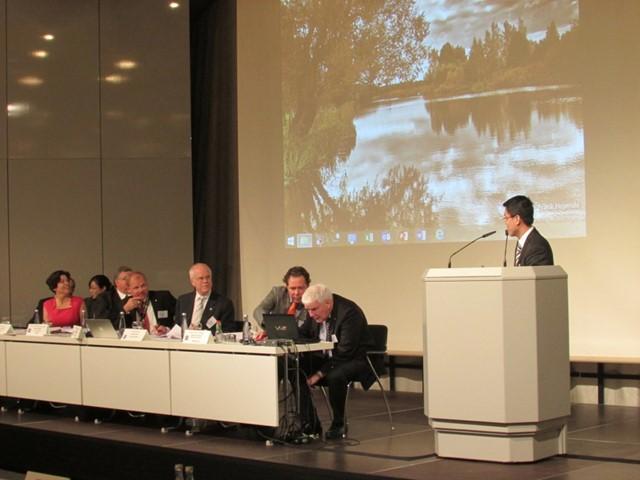 During the discussion of the presentation of the materials of the Shanghai Museum of Humanism
During the discussion of the presentation of the materials of the Shanghai Museum of Humanism
After the end of the FIAT-IFTA congress, it was time to study the ritual branch of Germany.
The funeral homes of Düsseldorf, Krefeld, and Meerbusch - that is, the cities of North Rhine-Westphalia - are a family affair. Most of them work in the fourth or fifth generation.
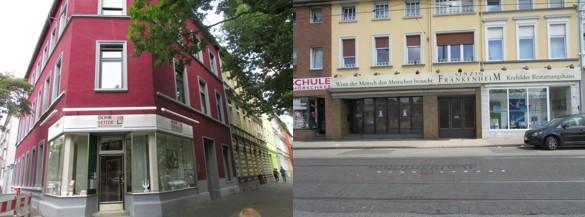 Funeral homes (in the photo on the right - you can see the gate for the arrival of hearses)
Funeral homes (in the photo on the right - you can see the gate for the arrival of hearses)
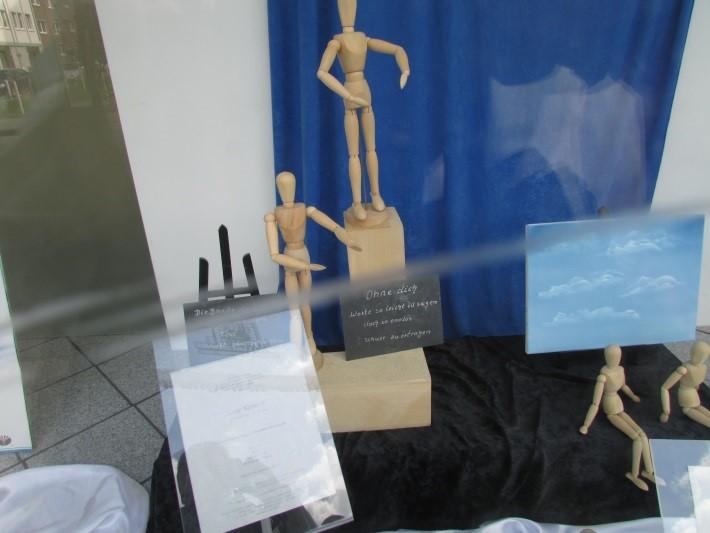
The design of the Funeral Home advertising window says little about the company's specialization
You can immediately read about the minimum funeral package on the showcase banner of the Funeral Home. Therefore, crossing its threshold, relatives already know how much, for example, a budget funeral. Let's be honest: in everything related to the funeral, the Germans are surprisingly frugal. It is extremely difficult to meet someone in Germany who would spend extra money on a farewell ceremony. However, budget funerals are just words because of the high prices for places in cemeteries, all funeral paraphernalia and services. We study the banner:
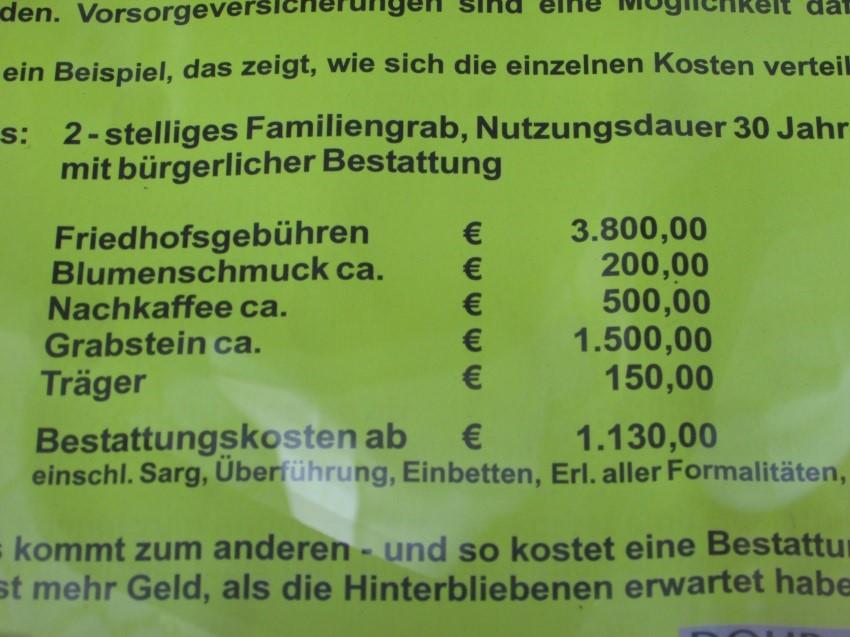 Grave with the possibility of burying 2 people for a period of 30 years
Grave with the possibility of burying 2 people for a period of 30 years
Cemetery services EUR 3,800.00
Disposable flower decorations 200.00 euros
Coffee after burial 1,500.00 euros (essentially a modest memorial service for coffee with croissants)
A small burial structure (approx. 60-70 cm) EUR 1,500.00
Transportation of the body (transport) to the cemetery 150.00 euros
Funeral expenses 1,130.00 euros (including coffin, removal team, documentation)
There are various social programs in Germany, especially special insurance, so a law-abiding citizen of Germany, as well as the state of North Rhine-Westphalia in particular, did not have to worry about the last way. The lion's share of costs, and often in full, will be borne by insurance companies. It all depends on what is written in the policy, what were the deductions, and for how many years.
What caught your eye in the cemetery? At the entrance there are companies that provide services already in the cemetery. That is, landscaping and burial structures.
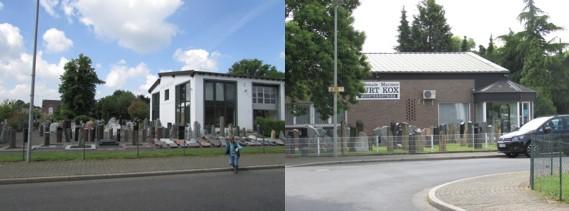 Company of burial structures at the entrance to the cemetery
Company of burial structures at the entrance to the cemetery
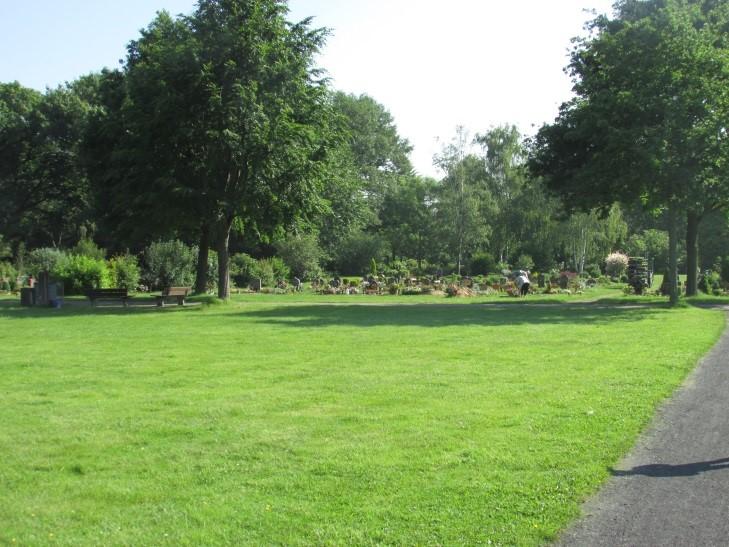 Company of burial structures at the entrance to the cemetery
Company of burial structures at the entrance to the cemetery
At the entrance to the cemetery there is a large free space with lawns and a park area. In the depths - the hall, or rather the House of Farewell. There is everything you need for the ritual. A place for a coffin, sound and lighting, rows of chairs - places for participants, even a large-scale funeral with a reserve, religious paraphernalia with everything necessary for a priest, a cart, a tribune with microphones, etc.
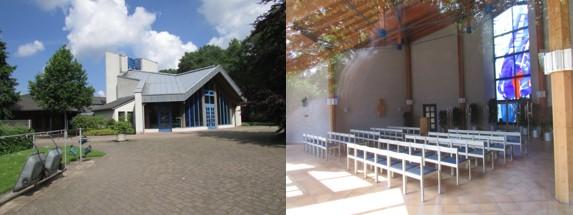 A place where a religious mass is said and said
A place where a religious mass is said and said
According to the law, two types of burial are possible. Funeral in a coffin is the most expensive option. The second option is cremation with the subsequent burial of the urn in the ground, in the forest-cemeteries of green ecological burials. Such burials were founded in Germany, supported by the Germans, and, as all over the world, are considered the burials of the XXI century. Especially in the USA, New Zealand, Great Britain, Australia and other countries of the world.
According to statistics, 70 percent of the dead are buried in coffins (this is too high for Europe), and 30 - in the urns.
According to Christian tradition, the funeral should take place no later than 3 days.
Most Germans turn to funeral homes, which deal with all organizational issues of the funeral, because the process is very time consuming and requires the collection of a large package of documents. All the details and details of the ceremony are discussed with the employee. Funeral expenses include the cost of renting a site in the cemetery and the costs associated with cremation, preparation of the grave, the cost of ritual services, associated costs such as burial, wreaths, flowers for the grave.
More about the cemetery itself. The cemetery has several zones. Where the deceased goes depends on his wealth and the financial means of his family.



The main plot is designed for 30 years. But here you can eventually bury family members (1-2 coffins and up to 4 urns with ashes). Such a plot in Krefeld will cost 3-4 thousand euros. And in such cities as Munich, Berlin, Hamburg or Frankfurt or Dusseldorf - the price will reach 8-9 thousand euros.
 In these areas, the duration of burial places can be extended in 30 years Monuments - one height (70 cm)
In these areas, the duration of burial places can be extended in 30 years Monuments - one height (70 cm)
It is important that the lease can be extended later. Those who will not be able to do so will have to sacrifice their financial situation. It will be leveled and urns will be buried here in the future. That is, there will be a new small area for urns. And there are only a few rows, of course, for a fee, where, in our opinion, there is enough space.
 Some rows have more space, but the buildings are traditionally low. Maximum 90 cm.
Some rows have more space, but the buildings are traditionally low. Maximum 90 cm.
It is important to note that German law prohibits the acquisition of land in the cemetery. All plots for rent, regardless of whether it is Berlin or the smallest settlement.
According to the law, all burial expenses are borne by close relatives of the deceased. If relatives do not have the financial means to organize a funeral, you can contact the social department for help. The cheapest option for a funeral in Germany is anonymous cremation, which will cost about 1,500 euros. The ashes of the deceased can be stored in the columbarium, or in the cemetery under the urns. There is a separate fee for this for the period specified in the contract.
To say that the laws are strict on the care of cemeteries is to say nothing. Didn't visit the burial place for two years, didn't take care of it, ruined it, picked up the weeds ?! Sorry, your site has been canceled! That is, leveled and planted with grass, and for you it actually disappeared. In its place - further space for ballot boxes for new "residents". Currently there is a temporary green lawn…
 To the left of the monument is not a lawn, but a canceled burial. Not cared for for 2 years
To the left of the monument is not a lawn, but a canceled burial. Not cared for for 2 years
A characteristic feature of cemeteries is their kind of unification. No one is different from anyone. All tombs or monuments are small - 70, maximum 90 cm, and differ only in color or shade.
Separately, the Ministry has recently allocated a plot of so-called expensive burials. That is, those landowners who deviate from the general rules.
 An example of an expensively decorated burial
An example of an expensively decorated burial
It is necessary to tell and about such. At each cemetery there is a floriculture with its own greenhouse. If you do not have enough time to take care of your plots, you can sign an agreement with such farms. They will take care of it, and the lawn will be in order, and the flowers will not only be planted in time, but also watered. They have everything: opportunities, special vehicles, workers, equipment, etc. Work without holidays and weekends. Except for Christmas.
 Flower farm with grave care services
Flower farm with grave care services
Jewish cemeteries are located separately. As is well known, the German authorities, having atoned for the sins of the Hitler regime, have been actively accepting ethnic Jewish families as permanent residences since 1991. And first of all from the countries of the former USSR. Today, the German Jewish community already has 130 synagogues in its territory. This is an extremely high figure. Only the United States can argue for this number.
 Jewish cemeteries are always located separately in cities
Jewish cemeteries are always located separately in cities
Of course, Jewish cemeteries appeared in every large settlement, and in small ones - separate areas. Everything is fine here with pomp. Most of the buildings on the graves are very powerful, with numerous inscriptions on the plinths and pedestals, photos, quotes from sacred books and more. Most Jews, of course, are from the territory of the former Soviet Union.
You will not be able to walk through such cemeteries in free access. There is a guard, and if you are even a Jew, but there is no pile on your head, you will immediately receive a remark.
We were launched into the territory and even allowed to take pictures because we were delegates to the FIAT-IFTA congress in Düsseldorf.
Animal cemeteries greeted us with neatness, neat memorials, toys and love for animals. They have their own security guards and their own care workers. In the cemetery you can find a biography of a pet, photos and even mini sculptures. Places have their value, and the lifespan of such graves is therefore strictly limited by contract. The size of graves is also limited. If it was, say, a dog of large breeds, a monkey, a pony or another animal of large size, they will be accepted here only after cremation.
 Animal cemeteries are usually located outside cities
Animal cemeteries are usually located outside cities
And finally, about the World Exhibition of the Funeral Industry, which opened in the main pavilion of the Düsseldorf Exhibition Center with the start of the FIAT-IFTA Congress. It will take at least half an hour to walk around a room the size of our Sports Palace.
The exhibition of funeral culture, goods and services BEFA-Expo is the main international exhibition of ritual work in Europe and one of the largest in the world. This event of international importance covers all areas of the funeral sphere, shaping the development trends of the industry in the coming years, but rather decades.
 Wide choice of ritual accessories in the sectors of manufacturing companies
Wide choice of ritual accessories in the sectors of manufacturing companies
 Mercedes-Maybach hearses had no equal in the Premium segment
Mercedes-Maybach hearses had no equal in the Premium segment
The innovations presented during the large-scale project, the demonstrated technologies and equipment, as well as the offered services are actively implemented by the participants and are in high demand from the end consumer.
One of the most important tasks of BEFA-Expo as an exhibition of ritual services is active communication between the leading players in this field of services, exchange of experience, and, of course, advertising of everything imaginable in this field.
Thanks to this business communication, new business connections are formed, contracts are concluded, standards of providing ritual services and production of this rather difficult product are raised.

The World Forum of Ritual Goods and Services did not leave anyone indifferent, glowing from flashes of photo and video cameras, inviting everyone to visit every corner with their goods or services, hospitably providing convenient places for negotiations.
Concluding my story about the funeral sphere in Germany, I would like to say this. We in Ukraine are waiting for the Verkhovna Rada to consider a new Law "On Funeral Affairs in Ukraine", which will enshrine new for our country Articles on Funeral Homes, Private Cemeteries and Crematoria, Forest Cemetery, Ecological and Green Burials. These ideas and principles, based on European and world experience, together with the Ministry of Development of Communities and Territories of Ukraine were developed by our public organization - the International Association of Funeral Professionals. The bill has been under consideration in parliamentary committees for a long time. We hope that soon our state will open a new page in the development of funeral culture, and the development of a full-fledged service of farewell to loved ones will open a qualitatively new range of services that have been provided in Europe and around the world for centuries. And at world forums and exhibitions of the highest level, we will become consumers of the best products of leading manufacturers at the level of funeral homes of advanced countries in Europe and the world.
